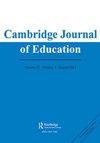Factors that motivate and encumber parental participation in children’s education in Ghana
IF 1.5
3区 教育学
Q2 EDUCATION & EDUCATIONAL RESEARCH
引用次数: 1
Abstract
ABSTRACT While some parents actively participate in their children’s education, others have been passive in playing this role. This qualitative research was conducted with parents of pupils in a Basic School as well as the teachers of primary classes four, five and six. Participants were purposively sampled due to their experience and knowledge in issues related to parents’ participation and non-participation in their children’s education. Findings revealed that parental participation stems from some parents’ belief that their active participation in their children’s education is part of their training. Barriers to parental participation in their children’s education include the high cost of living, which keeps parents preoccupied with economic ventures, and low self-esteem due to some parents’ illiteracy, which makes them feel they cannot offer much besides paying their children’s school fees. The authors recommend that school authorities include parents in planning programmes in which parents are expected to participate.激励和阻碍加纳父母参与儿童教育的因素
一些家长积极参与孩子的教育,而另一些家长则是被动的。这项定性研究是对一所基础学校学生的家长以及小学四、五、六班的老师进行的。由于他们在父母参与和不参与子女教育相关问题上的经验和知识,参与者被有目的地抽样。调查结果显示,父母的参与源于一些父母认为他们积极参与孩子的教育是他们训练的一部分。阻碍父母参与孩子教育的因素包括:生活成本高,这让父母忙于经济投资;一些父母不识字,这让他们觉得除了支付孩子的学费之外,自己做不了什么。作者建议学校当局将家长包括在期望家长参与的计划中。
本文章由计算机程序翻译,如有差异,请以英文原文为准。
求助全文
约1分钟内获得全文
求助全文
来源期刊

Cambridge Journal of Education
EDUCATION & EDUCATIONAL RESEARCH-
CiteScore
5.30
自引率
4.30%
发文量
35
期刊介绍:
Cambridge Journal of Education publishes original refereed articles on all aspects of education, with a particular emphasis on work that contributes to a shared understanding amongst academic researchers, theorists, practising teachers, policy-makers and educational administrators. The journal also welcomes the submission of systematic review articles that summarise and offer new insights into specific areas of educational concern. With a wide international readership, Cambridge Journal of Education publishes contributions drawn from different educational systems and cultures enabling continued in-depth discussion of global educational theory, policy and practice. The journal’s Special Issue programme encourages and stimulates focused discussion and engagement with significant themes and responses to topics raised by readers and contributors. Cambridge Journal of Education welcomes proposals for future editions.
 求助内容:
求助内容: 应助结果提醒方式:
应助结果提醒方式:


